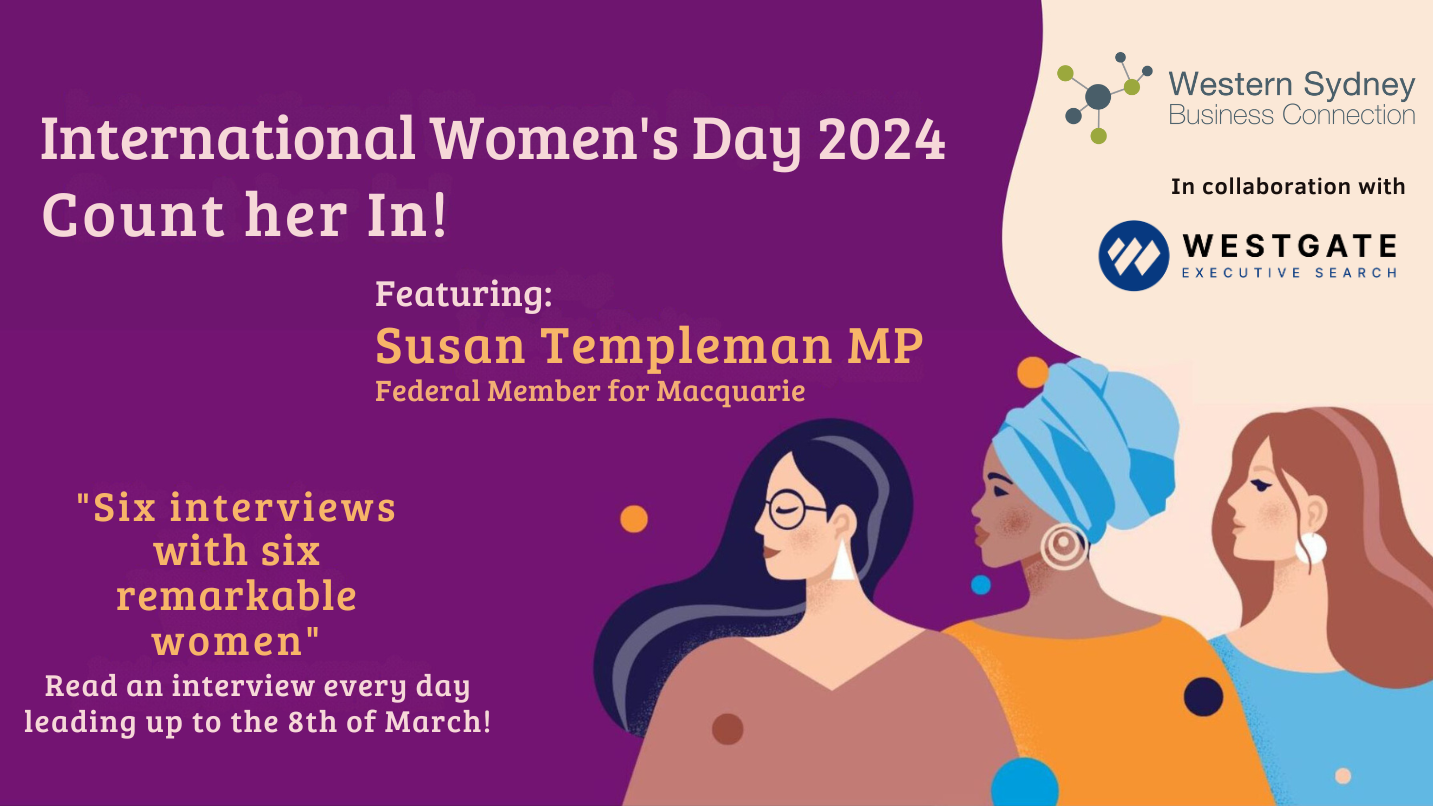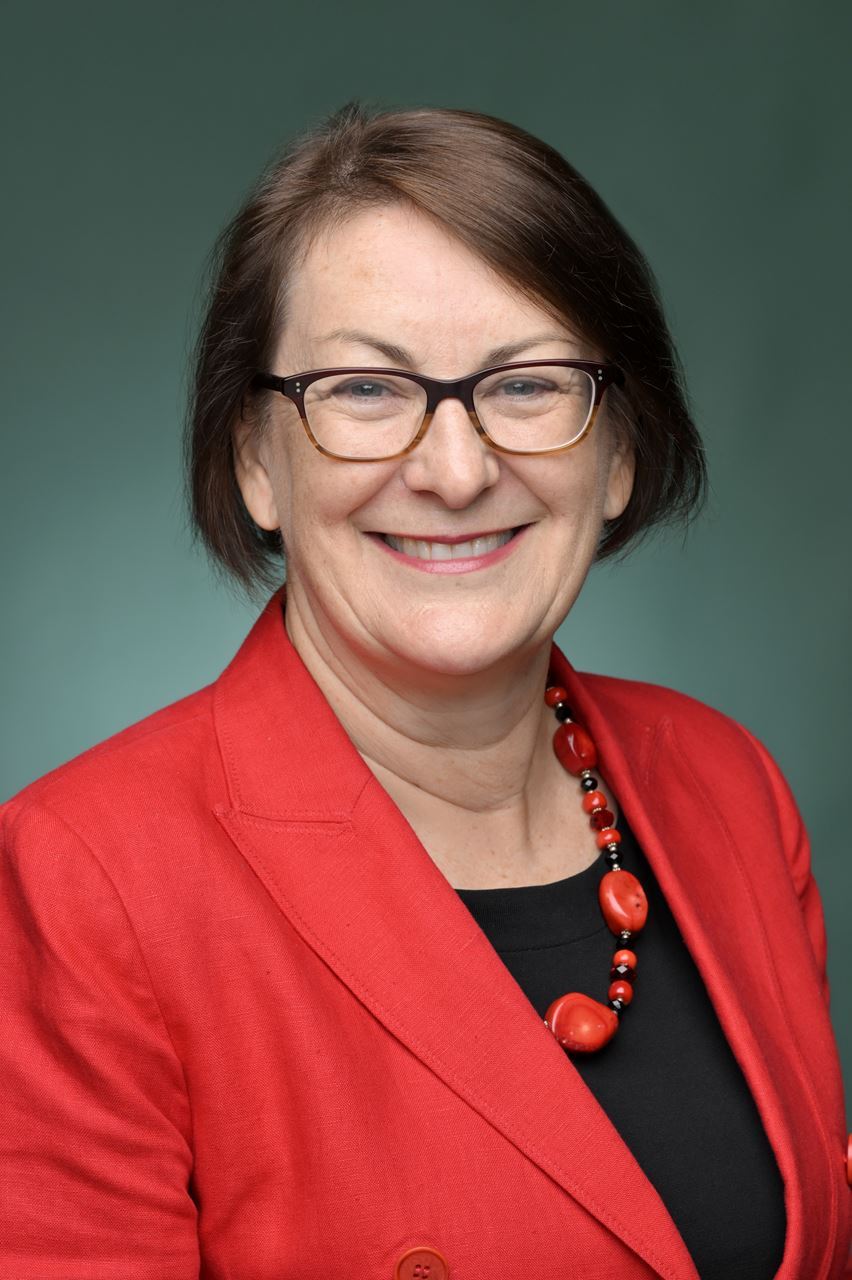UN Women Australia has announced its theme of International Women’s Day 2024 as: Count Her In: Accelerating Gender Equality Through Economic Empowerment. At the Western Sydney Business Connection we wholeheartedly embrace this theme! We present, in collaboration with Westgate Executive Search, a leadership interview series featuring six influential women in our region. With an exclusive article each day leading up to the 8th of March, we celebrate prominent female leaders shaping Western Sydney's business, social and economic landscape. Explore their perspectives, experiences, and commitment to diversity and inclusion.

In our final installment for our COUNT HER IN Interview Series, we spotlight Susan Templeman MP, Federal Member for Macquarie. From journalist to politician, Susan's journey is marked by resilience and advocacy for education, mental health, and social justice. As Australia's Special Envoy for the Arts, she champions creativity's role in policy. Susan reflects on her experiences, highlighting the need to support women's aspirations in politics and beyond. Join us in celebrating her story and the impact of women's leadership.
Susan Templeman MP
Federal Member for Macquarie

Susan Templeman MP is a politician, currently serving as a Member of Parliament in the House of Representatives. She was first elected as the Member for Macquarie at the 2016 election, with re-elections in 2019 and 2022. Her career in journalism included many years as a foreign correspondent in New York and London. In the early ‘90s she started a Media and Communications Business, while being an advocate in her community. Susan focuses on issues such as education, mental health, and social justice. In 2022, she was appointed as Australia's Special Envoy for the Arts by Prime Minister Anthony Albanese.

Jacqueline Clements: Can you share what sparked your interest in politics and how you eventually became a Member of Parliament?
Susan Templeman MP: Let’s start by saying that I never expected to become a Member of Parliament. I began my career as a journalist at the Canberra Press Gallery back in 1985, in the Old Parliament House during the Bob Hawke era. I was 21 and witnessed politics unfold and history being made before my eyes. That was my political education. It was such a privilege to see the parliamentary process at work from up close.
It wasn’t until later, after returning to Australia from years of working overseas, and having started a family, that I realised the need for change. My family faced the challenges of supporting a child with serious mental health issues within a system of government that wasn’t working well. That planted a seed for me. When sharing the story of my daughter’s challenges within the community, other families shared their stories with me. It made me realise that many families were struggling with the existing systems.
When the former member for Macquarie, announced his retirement I thought it would be good for our community to have a woman representing us. And I just decided to give it a go. I was in my late forties, wanting to use my life experience in helping to make a difference in mental health and related areas. That’s how my career as a politician started. However it wasn’t smooth sailing. I lost my first election in 2010 and lost again in 2013, finally being elected in 2016.
JC: Your political and personal journey has been marked by a lot of resilience and determination. In 2013 you and your family lost your house to the Blue Mountain bushfires. How did you bounce back and how has this influenced your approach to politics?
ST: Admittedly 2013 was not my favourite year. I turned 50, lost an election and my house burned down. Disasters often make people want to leave, but to me and many others affected by the Blue Mountains’ bushfires the opposite happened. There was such strength and connection in the community. The support from local organisations helping with the recovery was fantastic. This embedded a belief in me that local community holds many solutions and pathways forward, particularly after a disaster. Looking back, I realise how crucial that experience was. It is often in hindsight that we recognise the value of our experiences. And in fact, I didn't know that years later I would be the member of parliament dealing with the Gospers Mountain Bushfires and then flood after flood after flood and storms in recent years.
In hindsight I also recognise that staying around after losing elections gave people time to learn to know me, allowing me to show the community that I was there for them. In the lead up to the 2016 election it was clear that I was going to be a strong voice, whether in government, in the opposition, or not elected at all. People recognised my genuine belief in the community rather than personal or political ambition.
The community I represent is remarkably diverse. Within this relatively small region there can be many opposing views, making it both challenging and fascinating. I acknowledge the importance of respecting different opinions, remaining open to learning about different ideas, especially when I haven’t formed a fixed position. But there are also matters I feel strong about, where not everyone might agree. I was a firm supporter of changing the rules around same-sex marriage and openly advocated for a yes vote to recognise Aboriginal and Torres Strait Islanders in the constitution. Sometimes you have to agree to disagree. Being respectful and acknowledging that my way is not the only way is important. I have been married for decades and even my husband and I don’t always agree on everything. It is therefore no wonder that there are many people in the community who have different views too.
JC: In 2022 you were appointed to be the Special Envoy of the Arts by the Prime Minister. Can you share your views on this role?
ST: The Prime Minister’s brief to me was to support the arts and advocate for the arts. It gives me an opportunity to raise issues with all ministers about the role the arts might play in their policy solutions. The last decade has been challenging for the arts. However we have returned to a situation where artists and peers make decisions about funding and grants. A year ago our new cultural policy came out, informed by national consultations.
Importantly, the arts are not limited to a small bucket of money with the word ‘arts’ written on it. In my view it is important to recognise that the arts can play a key role in many key policy areas such as disability, education, and wellbeing. Every portfolio has opportunities for arts and culture. It is also important that we support as many artists as we can in different parts of their career. I now have the privilege to see a lot of arts and cultural performances in different places around the country. It allows me to have discussions with artists and creators from the film industry through to the circus. It's a delight to see the incredible creativity.
JC: As we celebrate International Women's Day we also reflect on the barriers that are still holding women back from reaching their full potential. Have you experienced such barriers in your career and how do you support women who aspire to a political career?
ST: I hope that the presence of women in politics in general, and my own presence in Parliament, serves as an example for young women that a career in politics is worthwhile and achievable. We all know that if you can't see it, you can't be it. I am proud that my daughter is now involved in politics and works in policy areas at a different level of government. My wish is that she and other women who aspire to a political career get the respect and recognition that I now receive.
But it has not always been like this. My career started as a journalist in a commercial radio news room. It was the 1980s and sexism was not subtle. Being quite shy, this required me to develop some key skills and stand up for myself. I would love to say that we have moved on since then, but unfortunately young women still face many challenges in the workplace and elsewhere.
This is why as a small business owner I have always employed women who just had children and couldn’t immediately re-establish themselves back into their TV or radio journalism roles. By providing this balance between work and home, my media business could hire the most amazing women. Of course it wasn't always easy, particularly when a baby got sick in the middle of the night and someone else had to step in at work at the last moment. Reflecting on this now, I realise how lucky I was to have my mum help me when my children were young.
My experience as a business owner has taught me how small businesses can make a big difference in supporting women who are juggling caring responsibilities and a professional career. But small businesses cannot always provide the next career step. Therefore I absolutely encourage and support women in planning where they want to be next and how to get there. I now have young women working with me who are still at university, soon moving onto the next stages of their careers. I’m excited to support them in either opening a door to a new opportunity or giving a nudge, backing their decision to step into that next challenge.
Presented in collaboration with:

By Jacqueline Clements
CEO, Westgate Executive Search